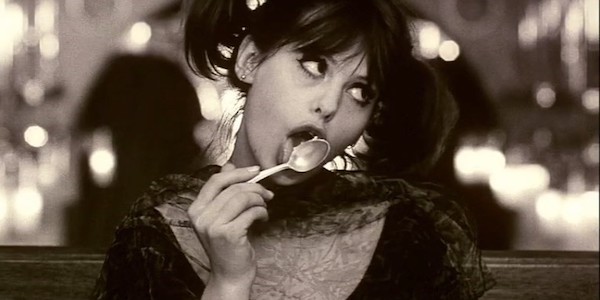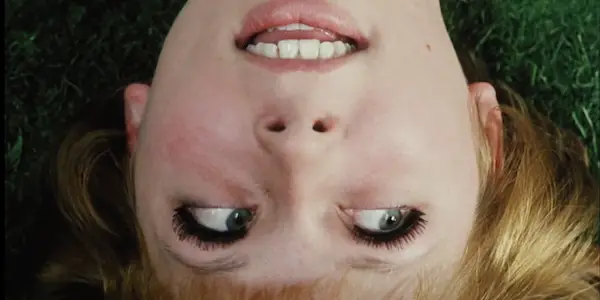DAISIES: The Audacity Of The Czech New Wave

Frances is a graduate of film and digital media from…
The French New Wave gets a lot of press due to its influence on the fine art of cinema. I have hardly met a film buff who would not cite Godard or Truffaut as an inspiration. Yet toward the tail end of this era, an equally fascinating — but far less known — movement blossomed: Tthe Czech (or, at the time, Czechoslovak) New Wave.
In the 1960s, Czechoslovakia was experiencing food scarcity, due to its failed production system. The demand for rationing and efficiency was stifling to many citizens. (More on Stalinist Czechoslovakia here.) In protest, the Czech New Wave grew among educated artists and filmmakers to express disappointment with and alienation from their government.
One of the best-known examples of the Czech New Wave is Věra Chytilová‘s Daisies or Sedmikrásky. Released in 1966, Daisies was created under a Stalinist government and among struggling citizens. Accordingly, it expresses the needs of its people and disobedience toward its circumstances, culminating in a beautifully hedonistic, absurdist film.
The Plot
Daisies opens its credits on a whirring machine intercut with footage of wartime explosions. Upbeat, repetitive drums play, sounding almost anthemic. We are introduced to two young women — the two Maries — moving robotically. Between more war footage, they declare that they are powerless, no one understands anything, and since the world is spoiled, they may as well be spoiled too.
From here, we begin a journey through a series of wildly unconventional vignettes. The Maries appear first in a Garden of Eden setting, where they eat an apple — the forbidden fruit. In a cut on action, they are transported to their apartment, a home base for their antics. A large pile of green apples lies on the bed.
About half the vignettes follow our heroes as they use their objectification to their advantage. Three times we see Marie 1, brunette, having dinner with an older man. She makes polite, demure conversation, performing dramatic public femininity. She is not hungry, just perhaps a small glass of wine.

Marie 2, blonde, joins them shortly into the meal. She is brazen, eating several courses without the help of utensils and commenting frequently on how much she loves food. The man, each time, is shocked but remains due to Marie 1’s cajoling. Then he is late for his train, and each time the Maries abandon him at the station.
Marie 2 has her fair share of courting as well. We see her coyly undressing in front of an unknown man, who nevertheless pines after her. He soliloquizes sappily for some time, finally declaring, “I must be in love with you.” Marie 2 pauses a moment, before asking, “have you got any food?”
In a particularly iconic scene, the two women listen to a suitor profusely exclaim his love for Marie 2 over the phone. Meanwhile, they use a large pair of scissors to slice and eat various phallic food objects such as bananas, pickles, and sausages, murmuring to each other about what to eat next. Nevertheless, the confused man attempts to respond to interjections like “perhaps a steak?” and “domestic fowl.”
The Maries continue their adventures, thematically but not narratively linked. They generally make fools of themselves, sneaking alcohol into a lounge, stealing from farmers and restroom attendants, and mocking the customs of the elite. Unconventional filmmaking techniques follow them, switching between color overlays and black and white, and cutting sequences experimentally.
These adventures culminate in a final quest for food when the Maries find a gourmet banquet set for a large party in a conference room. They set the table for a full banquet, serving plate after plate, eating only a bite from each. Climactically, they have a massive food fight and an improvised fashion show, destroying or trampling every dish on the way.
Insolent Absurdism
Daisies showcases its profound absurdism from the beginning. Shortly into the film, Marie 1 enters her apartment to find Marie 2 lying on the bed with her eyes closed. Their stove has been filling the apartment with gas for some time. Marie 1 approaches her still friend, only to chide, “And who’s going to pay for this?” Marie 2 opens one eye, laughing and saying, “Dead men tell no tales!” Marie 1 points out that she forgot to close the window.
The unseriousness of death in Daisies is a conscious but not an entirely morbid choice. Nothing is taken seriously in the film. The Maries frequently sling at each other words that become an absurdist chant: “Do you mind?” “I don’t mind!” “Does it matter?” “No, it doesn’t!”

Once, upon answering the phone in her apartment, Marie 2 greets an anonymous caller: “Rehabilitation center. Die! Die! Die!” She giggles in a high voice and hangs up. The women wrap each other up in blankets: “Die! Die! Die!” and “Can you feel how volatile life is?”
It reads almost deliriously, flailing between the voids of unbridled happiness and nihilistic despair. And this is the only place absurdism can really prosper. Between the euphoria of “how volatile life is,” and the gaping hole of “what will become of us?” is where Daisies makes itself at home.
Silly or Sophisticated?
Many individual scenes or vignettes from Daisies could, without insight, seem silly or trite. After all, they’re nothing but the misadventures of two spoiled girls. The Maries seem to be aware of this, sometimes feeling slight remorse over their actions, though more often reveling in them.
For instance, the Maries’ treatment of the older men they date could be perceived as exploitative. He pays for them to feast, and they leave him behind. They entertain men clamoring after them, admitting love over the phone, while they talk to each other about food and cut up phallic objects.
However, a surface reading deprives Daisies of its true value. Its characters and situations are fully symbolic. The Maries are even named, I would make informed speculation, for the biblical Marys of Nazareth and Magdalene, or more colloquially, the Madonna/Whore archetype.
The people the women interact with, the situations they create, are no less meaningful. When the Maries steal, they are stealing power. When they stuff themselves with an ornate banquet, they are hungry people finally filling their stomachs at the expense of a negligent elite. They are the manifestation of a desire for that which much of their population struggled to find — food, power, and agency.
The excess of food is a dangerous theme in Daisies. The citation of “food waste” was part of the reasoning behind Chytilová’s blacklisting from filmmaking shortly after its release. The Maries did indeed eat tremendous amounts of food, take milk baths, and destroy an entire banquet onscreen. It was a risky choice to display that particular indulgence at a time when much of the nation was suffering from food shortages — but that was the point of the endeavor.

The “moral” of the film addresses its very content and controversy. The last segment of Daisies plays on the “immorality” of the Maries, condemning them for misbehaving and saying that even with hard work, they would never be able to undo the damage they caused. Nevertheless, the Maries, dressed in newspapers and string, clean up the banquet room they have just destroyed, arranging broken dishes and mushed food on the table. They repeat how happy they are and how well they’ve done and how hard work has led them to happiness. After several minutes of this, one of the women says: “But it doesn’t matter!” and the chandelier above them falls, presumably crushing them.
To me, this sequence reads as somewhat of a meta-excuse for the film — a reasoning to authority that really, Chytilová was condemning the Maries all along. And yet, the last shot is laid over with text saying (in the Criterion translation), “This film is dedicated to all those whose sole source of indignation is a trampled-on trifle.”
I’m certain that more intelligent viewers than I have analyzed this pithy statement. But it seems to me an invocation of absurdism, of the ridiculousness of power and the desire to act disobediently to reclaim that power. What is disobedience but the disavowing of norms created by the self-proclaimed upper class of society?
The deep hedonism of Daisies, its carelessness bordering on recklessness, flouts Chytilová’s repressive government. Though it temporarily ended her filmmaking career in Czechoslovakia, it was heaped with praise outside of the country. And its acclaim continues — the Maries remain symbolic of experimentalism, indulgence, and chaos.
Conclusion: Daisies
Daisies is a splendid amalgamation of seemingly unrelated vignettes. We see the Maries sneak into and meddle with upper-class society — as well as the odd farm — acting as agents of chaos, bringers of entropy. They reclaim power any way they can, perhaps acting as stand-ins for the needs of Chytilová’s countrymen, or for a desperate desire for revenge on authoritative oppressors.
The Maries use their sexual objectification to obtain food, and sometimes directly steal it, for a hunger existing beyond need into hedonistic excess. They personify desires that must have overwhelmed their nation at the time. The women, having recognized the world around them as spoiled and uncontrollable, attempt to reclaim agency in any way possible. Through her characters and occasional text narration, Věra Chytilová speaks truth directly to power.
Daisies captures a cultural moment impossible to fully express without a full screening of the film itself. Accordingly, I cannot recommend it enough. It is a must-watch for scholars of New Wave, for fans of artistic rebellion, and for lovers of absurdism.
It is unashamedly flippant toward its circumstances and to authority in general. Its unapologetic hedonism is joyful, and further, provides a sense of satisfaction fueled by the undermining of oppressive authority. Its unconventional techniques involving color and editing, along with its bold ideology, place Daisies firmly as a paragon of the New Wave movement.
Have you seen Daisies? Who’s your favorite New Wave director?
Watch Daisies
Does content like this matter to you?
Become a Member and support film journalism. Unlock access to all of Film Inquiry`s great articles. Join a community of like-minded readers who are passionate about cinema - get access to our private members Network, give back to independent filmmakers, and more.
Frances is a graduate of film and digital media from California. She enjoys watching and expounding theories on cinema, especially when experimental or directed by women. In her spare time she enjoys reading short stories and writing queer fantasy.













